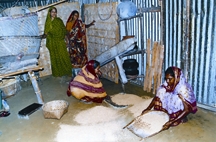Dheki
Dheki a wooden device for husking paddy to make rice, the staple food of Bangladesh. Husking machines and automatic rice mills are now used in the country but dhekis are still in use in large numbers in villages. Indo-Aryans used udukhal and musal for thrashing wheat and barley, the two principal crops in Aryan India. The udukhal (colloquially ukhli) was made of a round block of wood about 36 inches in height and 36 inches in diameter and was hollowed at the top with a depth of 18 inches. The musal was simply a pestle of solid wood about 45 inches in height with a diameter of about 9 inches. In addition to the dheki, the udukhal and musal are still in use in some parts of Bangladesh.

Dheki consists of a wooden lever, usually about 72 inches long and 6 inches in diameter. It moves on a small bolt passing through it and two cheeks, which are driven into the ground, until the bolt is about 18 inches high. Under one end of the lever is fastened a cylindrical piece of wood, about 18 inches in length and 6 inches in diameter, the lower end of which is surrounded by an iron hoop. This serves as a pestle, that is raised by the lever, and that falls down by its own weight. The power is increased by the bolt that serves as a fulcrum. It is placed at five-eighths of the whole length of the lever from the pestle.
Usually, 2-3 women work with this device, 1-2 alternatively press down the end of the lever with their feet to raise the pestle, and then by removing their feet allow the pestle to fall. One of them removes the beaten grain, and puts a fresh supply into the device which just is a circular hollow in the ground with a piece of wood in the bottom to receive the blow. The work of women who move the lever is laborious. Sometimes a woman will perform the whole work on her own and use the shell of a ripe coconut with a long handle, by means of which she will move the grain. Women engaged in this exercise sometimes sing songs to alleviate their labor.
In Bangladesh the female-centred cottage industry of rice-husking is gradually being replaced by rice mills. However, rice mill owners assign manual jobs to women. But the practice of purda (veils) prevents many Bangali Muslim women from accepting' this assignment. [KMA Aziz]
